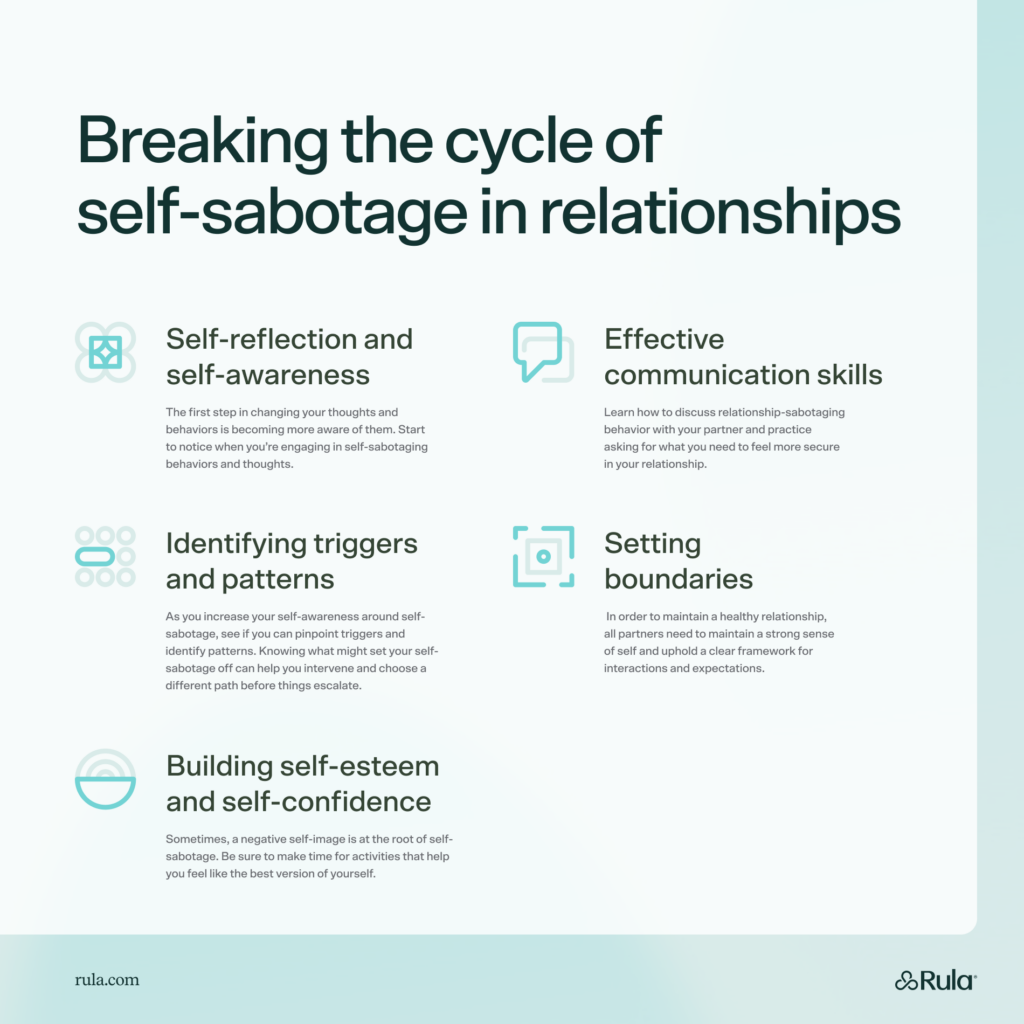Key Takeaways
Self-sabotage isn’t typically a conscious choice. It involves a set of involuntary thoughts and behaviors that can weaken the strength of your relationship.
Self-sabotage often stems from trauma or negative past experiences that make it difficult for a person to feel worthy of love or safe in relationships.
The first step to stopping self-sabotage is recognizing these patterns. Once you identify them, you can start changing your thoughts and behaviors to build healthier, stronger relationships.
Sometimes, people engage in self-sabotaging thoughts and behaviors that undermine the health of their romantic relationships. This doesn’t necessarily mean their actions are intentional or that they must bear all the responsibility for the problems in the relationship. It may be due to some underlying causes or past experiences that make it difficult to demonstrate trust and vulnerability with their partners.
If you’re experiencing self-sabotage, you can work to change your thoughts and behaviors. With time, practice, and the right support, you can learn to build healthy, fulfilling, and lasting relationships.
What is self-sabotage?
Self-sabotage happens when unconscious thoughts or actions hurt your romantic relationship without you meaning to. It can show up in many ways, like having unrealistic expectations, pulling away from your partner, or not being honest. These behaviors can create distance, break trust, and cause ongoing problems that stop the relationship from growing and feeling healthy.
Signs you’re sabotaging your relationship
One of the first and most important steps in overcoming self-sabotage is to learn to recognize when you’re doing it. The following signs may indicate that you’re at risk of harming your relationship with self-sabotaging behaviors and thoughts.
Creating conflict or drama
Fixating on your partner’s flaws or constantly criticizing them
Avoiding spending quality time with your partner
Withdrawing emotionally or failing to communicate your needs
Ignoring problems even when they’re negatively affecting the relationship
Avoiding intimacy (emotional or physical) in ways that hurt your partner and create distance
Failing to take responsibility for your shortcomings and, instead, always shifting the blame to your partner
Making unfounded, negative predictions about the future of the relationship
Why does self-sabotage happen in relationships?
Self-sabotage happens for many reasons. But there are usually some underlying factors and past experiences that contribute to it. Often, these stem from past traumas or relationship dynamics that leave a person feeling unworthy of love, afraid to commit, or unable to fully trust and be vulnerable with someone else.
Sometimes these feelings are based on negative childhood experiences. For example, if you grew up in a home where your caregivers were unable to demonstrate warmth or meet your basic needs, you might develop an insecure attachment style. Left unaddressed, this can make it difficult for you to develop healthy romantic partnerships later in life.
Low self-esteem may also contribute to self-sabotage. People who struggle with their self-worth often have a hard time seeing themselves as worthy of a healthy and committed partnership. They may unconsciously undermine their relationships with self-sabotaging behavior in order to “confirm” what they believe to be true about their self-image.

Breaking the cycle of self-sabotage in relationships
If you or your partner is engaging in self-sabotage and it’s negatively affecting your relationship, know that with some patience and practice, you can repair your connection. While there are times when it might be best to seek professional help for self-sabotage, here are some steps you can take toward self-improvement.
Self-reflection and self-awareness: The first step in changing your thoughts and behaviors is becoming more aware of them. Start to notice when you’re engaging in self-sabotaging behaviors and thoughts.
Identifying triggers and patterns: As you increase your self-awareness around self-sabotage, see if you can pinpoint triggers and identify patterns. Knowing what might set your self-sabotage off can help you intervene and choose a different path before things escalate.
Building self-esteem and self-confidence: Sometimes, a negative self-image is at the root of self-sabotage. Be sure to make time for activities that help you feel like the best version of yourself.
Effective communication skills: Learn how to discuss relationship-sabotaging behavior with your partner and practice asking for what you need to feel more secure in your relationship.
Setting boundaries: In order to maintain a healthy relationship, all partners need to maintain a strong sense of self and uphold a clear framework for interactions and expectations.
Dig deeper:
How therapy can help address self-sabotage
If you’re worried about how self-sabotage is affecting your relationship, know that you’re not alone and that help is available. Self-sabotage is usually an unconscious process. But once you begin to notice it, the next step is finding the support you need to change your thoughts and behaviors.
At Rula, we’re here to make it easier to find a therapist to help you overcome self-sabotage or any other emotional challenges you’re currently facing. In about 30 seconds, we can match you with a therapist who takes your insurance so that you can begin receiving care as soon as tomorrow. Whether you need individual or couples therapy (or both), we’re here to help you find the support you need to build a healthier, more fulfilling relationship with yourself and your partner.
Therapy for relationship issues near you
New York, NY – Houston, TX – Rancho Cucamonga, CA – Austin, TX – Chicago, IL – Los Angeles, CA – Columbus, OH – Portland, OR – Dallas, TX – Jacksonville, FL – Charlotte, NC – Denver, CO – Huntsville, AL – Philadelphia, PA – Seattle, WA – Find your city